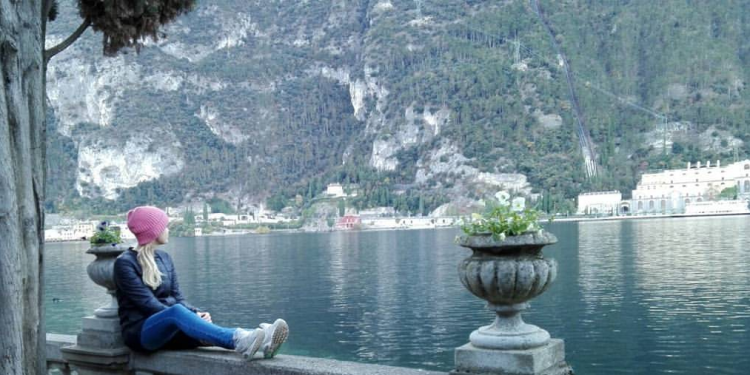Please introduce yourself. Where are you from, what are you doing in Verona, and what were you doing before you arrived in Italy?
My name is Alexandra. I'm Russian, from Moscow, 31 years old. I have a degree in Economics and Management, and I have English language, HR, and studio photography certifications. I've been working remotely as a recruitment manager for a language company in Moscow for more than eight years. On the side, I have my blog that helps Russian tourists in Italy.
What brought you to Italy? How long have you been in Italy?
I wanted to learn the language. Also, most of my friends are Italians from Verona, and I adore the culture and the Italian food.
What is the process to move to Italy?
The easiest way to move to Italy is to come as a language student or to enter into higher education. Studying Italian costs about 8,000 euro per year (without accommodation), and the school organises your residence permit and helps you to find accommodation. As for the university, you need to prepare all the documents almost one year in advance, and for international students, the fees are between 300 to 1000 euros per year.

What is your favourite thing about Italy, and what is your least favourite thing?
My favourite thing about Italy is the culture. Italians are always positive and enjoy every moment of their life. One of my Italian friends has said to me: "You live to work, we work to live". Italians are extremely friendly and open-minded — you can't find better friends, than Italians. On the other hand, my least favourite thing is that all the shopping centers and stores close just after 6 pm. Also, you can't do shopping on Sundays, as everything is closed. For me, it's a bit strange because I am used to Moscow's rhythms where everything works 24/7.
What has surprised you the most about Italy?
The fact that I need to go to a driving school and take the driving exams for the second time in my life. Russians, Ukrainians, and Belarusians cannot convert their driving licence in Italy. After one year in Italy, you can't drive with your Russian driving licence — you have to obtain the Italian one. So now I am a student again.
What are the features of today's expat job market in Italy?
Despite the fact that it's very difficult to find a job in Italy, for expats it's easier than for Italians. If you are fluent in English and at least one more foreign language, you can work as a translator, waiter, hotel manager, or a language teacher. But note that when you are job hunting, you don't send your CV to future employers — instead you print lots of CVs, and drop them at the places you want to work for.
How easy or difficult it is to find accommodation in Verona, and what type of accommodation is available for expats?
For students, it's easy to find accommodation in Verona. If you have any other type of residence permit (permesso di soggiorno), better to rent a flat through an agency. The documents you will need to rent a flat in Verona are your passport, your residence permit (permesso di soggiorno), and your job contract or a letter from the university, which proves that you are a registered student.

What are the year's biggest holidays in Italy? What is some essential etiquette?
The biggest holiday for all Italians is Christmas, and they adore to celebrate it with their family and many friends. The thing which I have found a bit strange is that they always use plastic cups and plates for their guests.
How do you find the lifestyle in Italy?
Italian lifestyle is a family get together, pizza, and lots of fun. I absolutely adore it!
How is the transportation system in Verona? How do you move around?
The transportation system in Verona as well as in all Italy is very bad. You will experience frequent bus cancellations, mainly to the ones that run later at night. I have never seen any bus on time. I travel by car and if I have something to do in the city centre, I take the bicycle because it's difficult to find parking space.
Have you been able to adapt to the society?
It has been very easy for me. As I said before, Italians are very friendly and are always willing to help expats in all possible ways.
What do you do in your free time?
In my free time, I travel a lot in Italy. I adore Garda lake near my place and spend a lot of time there. Also, I do yoga and ride my bicycle. I write my blog about Italy and take pictures (I am a professional photographer). In Italy you can't be bored — I always find something interesting to do.
What new habits have you developed in Italy? And what old habits have you quit?
In Italy, I fell in love with cycling and yoga, and I quit smoking (it costs a fortune here to smoke).
What is your opinion on the cost of living in Verona?
Verona is quite cheap when comparing to Milan for example. A bus ticket costs between one to four euros depending on the zone you are travelling in. A pack of cigarettes costs about five euros. A loaf of bread costs 50 cents. A breakfast in a café costs about two euros and a business lunch around seven euros.
What is something that you would like to do in Italy, but haven't had the opportunity to do yet?
I would like to do kitesurfing. There is a kitesurfing station in Riva Del Garda.
Please share your most memorable experience in Italy.
It was the day when I did 100 kilometres on my bicycle from Verona to Garda Lake and back. It was the first time I used my bicycle.
If you could do the move to Italy over, what would you do differently?
I would organise everything well in advance. Moving to Italy was a spontaneous decision, and during the first three months I had many difficulties.
What do you think of the local cuisine? What are your favourite dishes?
Italian cuisine is like from a fairytale! The cuisine is a cult in Italy. Italians are so passionate about their traditional dishes. I recommend that you visit an Italian family for dinner for an original experience. In different parts of Italy, you can try completely different cuisines. For me, the best one is in the South, in Palermo. My favourite dishes are all types of pasta, arancini, and cannoli pastries.
What do you miss the most about your home country?
I miss my family and the freedom to express myself in my mother tongue.

Have you had a moment that you almost felt like leaving from Italy? How did you overcome that?
I have had a moment like this after my first year in Italy. I was completely upset about work and wanted to return to Moscow, but my friends and my husband helped me a lot to overcome the issues, and I very quickly understood that there are people who love me here in Verona, and I can't just leave.
If you had to advise an expat on five items to bring with them in Italy, which would that be?
Books in your mother tongue. Medicine (for example, aspirin costs a lot here). Laptop with Russian keyboard. All your documents (degrees, birth certificate, etc.) legalised in the Italian embassy in your home country. Your favourite objects from your apartment back home to feel more at home.
What are your plans for the future?
I am going to stay here for a long time, maybe forever. I have some projects to work on and would like to start my own business.
What is one thing that you will take with you from Italy?
My husband, who is Italian.

















Contact us to be featured in the Interviews section.
Participate